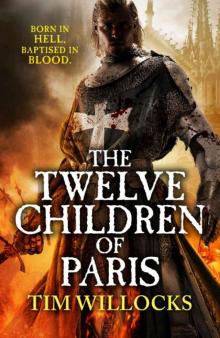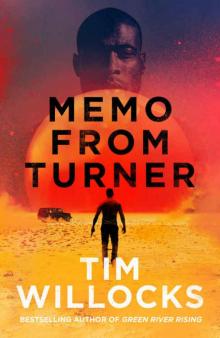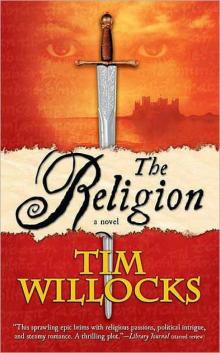- Home
- Tim Willocks
Memo From Turner Page 3
Memo From Turner Read online
Page 3
‘Jesus, Hennie, you’re not going to leave me here –’
Hennie closed his door and drove away.
He watched Jason, reflected in the wing mirror, scramble to his feet. He stood there, frantically going through his pockets. It felt like abandoning a giant child. But these lads had to grow up. Hennie found Rudy Britz’s number on his mobile and dialled it. In the rear-view mirror, he saw Jason run after him, waving both hands above his head.
‘Christ,’ said Rudy. ‘Seven on a Sunday morning? What do you want?’
‘I want you to hear this from me,’ said Hennie. ‘You’ll be getting a call from that nephew of yours. He’s been a silly boy.’
3
The girl looked as dead as any corpse Turner had seen.
She was a black African, mid-to-late teens, and lay prone with her left cheek resting on the sun-baked dirt of the lot. Flies crawled over her eyeballs and her desiccated lips. A bruise bulged from her right cheekbone. She didn’t appear to be breathing. But greater diagnosticians than he had zipped the living into body bags and he was the first responder. He had to be sure.
He squatted and felt for the carotid pulse between gloved fingers and thumb.
After a moment, he withdrew his hand.
He guessed she weighed well under forty kilos. Her short, thin cotton dress, pale green with yellow flowers, had been torn from waist to hem to reveal emaciated buttocks and thighs. Soiled underwear, more recently soiled with moist red clots and excrement. Her right hip was grossly deformed, the overlying skin pulverised and sheared aside in a ragged, shrivelled flap. Raw white and red shards spiked through the breach in her flesh, their edges and spicules rimed with an obscene coagulant of marrow and blood. More feasting flies.
Turner’s guts rose inside him with something more than mere disgust, something that evoked outrage and confusion, and a memory he rarely dared revisit and never willingly: of another young woman lying broken and dead on another sun-baked street. The police had stood over her body, too. But not in search of evidence, least of all justice.
His mouth flooded with saliva, acrid yet sweet. He stood up and looked away and marked a spot at the edge of the lot where he might vomit without contaminating the scene. He swallowed. He took a deep breath and exhaled slowly. Balance the chi. Engage the mind like the moon. Cool, distant, objective, aware. The memory sank back into the darker regions of his psyche. He turned back to his work.
The girl’s right leg was fractured below the knee, the skin tented above one broken tip of the fibula. He stepped around the corpse. Her left hip was swollen with a huge haematoma but the skin was unbroken. Her whole pelvis seemed abnormally canted from the axis of her spine.
Her left arm was trapped beneath her body. No reason to disturb her until the techs showed up. Her right arm was outstretched and its clenched fist swarmed with copper-coloured fire ants. A narrow column scuttled away with their winnings. He bent for a closer look. The ants were harvesting an organic material extruding from between her fingers. He prised the fingers open and saw a mass of bread and ground meat, mixed with a pale yellow goo. The ants swarmed in. He dusted the insects from his gloves before they could bite him.
He assumed the cause of death to be catastrophic internal trauma. A more expert assessment was up to the techs and the coroner. Where were the uniforms? Lost in the maze of unmapped and nameless alleys. Or doing battle with the living rather than standing over the dead. Statistically, by the square metre, Nyanga township was a competitor for the title of highest crime neighbourhood on the continent.
Turner stood up and took out his phone.
He circled the body, taking photos from a variety of angles.
He took photos of the blood trail that led five metres to the garbage dumpster.
He had noted the dumpster on his walk from the car. It stood at the rear of the vacant lot where she had died, distinguished from its neighbour on either side by a depression punched into the galvanised metal about a metre above the ground. He took a photo and examined the surface. Spray-painted black. At the rim of the depression the paint was marked by fresh abrasions and cracks where clean metal shone through. He assumed that paint fragments would be found on the girl’s dress and skin. He snapped two close-ups. A blue Bic lighter lay on the ground. He shot it and bagged it. He took photos of the tyre marks scored into the dirt in front of the dumpster.
Turner went back to the corpse and sat on his heels. Around her neck was the sling of a handbag. One tatty corner stuck out from beneath her chest. He tugged it free and lifted her head to free the sling. He looked inside the bag. Four coins. A dirty handkerchief. A child’s finger puppet – a penguin. Nothing else but a grubby business card. He looked at the card.
Warrant Officer
RADEBE TURNER
Underneath his name was his office phone number. He turned the card over and saw his mobile number, written in his own hand. He studied the girl’s face.
He studied her for a long time. Her blighted youth. The desperation that had marked her even before her death. The mask of her final agony in this barren trash-strewn garden. Not merely her own history written there, but that of a failing civilisation. He looked again at the handwritten number on the card, as if it represented an indictment from some higher court of his own role in that failure. He was certain he did not recognise her. He did not know how or why she had come to be carrying his card. He handed them out often enough to witnesses. He added his own number less often, for people who might need his help. He hadn’t been much help to her.
He stood up and turned as he heard a sound behind him.
A lean African, thirties, bearded, leaned against the doorway of the shebeen, rubbing the corner of one eye with the first knuckle of his thumb.
‘Nothing worth stealing on her, man. Police be here soon.’
Turner was dressed in light mountain boots, hiking pants and a pale blue hiking shirt that hung out to cover the gun on his hip. The shirt was one size too big to give him the room to move when he needed to. He took no offence at being mistaken for the lowest kind of scum. He held out his identification card in his gloved hand.
The African straightened up and retreated behind a sudden barrier of fear.
Turner took a photo of the front of the bar. The timber was painted green, peeling here and there in the heat. A hand-painted sign named it THE DUBLIN CASTLE. A second sign promised LUXURY! Turner walked closer as something caught his eye. He studied the fresh white wood and splinters that surrounded a bullet hole. He took a photo. He looked at the African. The African hunched his shoulders and sucked his teeth.
‘What’s your name, sir?’
‘Khwezi’ll do.’
‘Did you call this in, Khwezi?’
‘Yeah, about three hours ago. Lucky it wasn’t something important.’
‘Busy night. Do you know who she is?’
‘No, I never seen her before.’
‘What did you see?’
‘I didn’t see the accident.’
‘That wasn’t my question.’
‘I saw her lying there when I closed up, when I took out the trash, around three o’clock.’
Turner watched him for a moment. Khwezi shuffled in his flip-flops.
‘At first I thought she’d just crashed out, you know? It happens.’
Turner watched him some more. For township boys like Khwezi, giving information to a police carried a vague stain of dishonour, no matter what the end. It was a mistake to get impatient with them. Let them get impatient.
‘That’s it,’ said Khwezi. ‘She was dead so I called the police. Three hours ago. I just need you to get rid of her before I open up again.’
‘Must have been a big vehicle,’ said Turner. ‘Gangsters?’
‘Shit, they weren’t no gangsters.’
‘So why are you afraid of them?’
‘Afraid of who?’
‘The people who killed her.’
‘I never seen them before either. And I wouldn�
��t know them if I saw ’em again.’
Turner nodded. ‘Do you sell cheeseburgers?’
Khwezi was taken aback. ‘Yeah, we sell cheeseburgers. Why?’
‘The girl fished one out of the garbage.’
Khwezi glanced at the dented dumpster, then at the dead girl. His head bobbed up and down, as if some lingering question in his mind had been answered.
‘How did it get there?’ said Turner. ‘The cheeseburger.’
‘Now you’re asking me to speculate.’
‘So you’re an educated man. Relatively speaking.’
‘I know the way things are, as in those fuckers are never going to pay for it.’
‘But you think they should.’
‘Damn right they should but they won’t so you’re wasting both our time.’
‘Give me something to work with. I’ll make them pay.’
Khwezi laughed. ‘Excuse me, officer, but you the one needs educating. It doesn’t matter what I saw or what I say I saw. I make a statement, my name comes up as a witness, then I’ve got some private investigator on my back who gets paid twice what you do, and he’s digging into my shit, my family’s shit, my bar’s shit, shit I did ten years ago. He’s standing on my throat while you’ve got your boot on my balls. So let’s say I’m more stupid than you think I am and I wear the cheap shirt and tie you buy me and I stand up in court. A crowd of fat white lawyers take it in turns to piss in my face and I’m the one who looks like he should be doing time.’
Turner said, ‘You’re right.’
Khwezi blinked twice. ‘OK then.’
‘Your name won’t come up. You don’t make a statement. You’re not a witness. You just tell me what happened. I’ll work with that.’
‘Shove her in the ground and move on, man. Nobody gives a shit. Nobody ever did. I mean, just fucking look at her.’
‘I have looked at her.’
Turner let that hang while Khwezi shuffled on the spot. He held the business card in front of Khwezi’s face.
‘Ask around,’ said Turner.
‘Turner. Maybe I hear a bell. What will they tell me?’
‘That my word is good. That you don’t want my boot on your balls.’
Turner bagged the card and put it in one of the pockets of his pants.
‘See?’ said Khwezi. ‘They’ll get away with murder, I’ll get fucked for selling my grandma’s mampoer.’
‘Is that what the driver was high on?’
‘If I didn’t see the accident, like I told you I didn’t, how could I see who was driving?’
‘So tell me who might have been driving.’
Turner saw Khwezi glance past him, a change of expression, a further retreat. Four boys in ragged shorts and bare feet had appeared. They were watching the work of the ants at a respectful distance. An audience wouldn’t help his efforts to loosen Khwezi’s tongue. Turner reached in his back pocket and called to the boys.
‘Hey, come here.’
The boys shrank away. Turner waved a fifty-rand note. The boldest led them over.
‘Any of you know that girl?’ asked Turner. ‘Or see what happened to her?’
The boys exchanged glances and shook their heads.
‘She got hit by a big car,’ said Turner. ‘You ask around for me, see if anyone did see it. If they did, you come back and tell Khwezi. Now go buy yourselves a cool drink.’
The leader snatched the note and skipped away with his comrades in pursuit.
‘So now I’m the neighbourhood snitch,’ said Khwezi. ‘Thanks a lot.’
Turner said, ‘Kinetic energy.’
‘What the fuck are you talking about?’
‘The vehicle that killed her didn’t move very far. To smash her up that badly in a short distance, it would have to be powerful and heavy. Say a high-end SUV. You said these people were white.’
‘I didn’t say that.’
‘But they’d hire white lawyers.’
Turner looked into his eyes and Khwezi held his gaze. Turner let his instinct make the calculation, then gave Khwezi the victory his pride required. He broke the stare and looked away at the shanties down the street. He sensed Khwezi recover himself.
‘I grew up in Khayelitsha,’ said Turner. ‘The cop is our enemy. Our money in their pockets. Friends tortured. Relatives who disappeared. I know.’ He turned back to Khwezi. ‘But I am not that cop. And you are lucky, because you are not my enemy.’
‘Whatever you say, man. I’m not trying to make this personal.’
‘I am,’ said Turner. ‘I don’t believe you’re the kind of man who could see a girl torn apart and not give a shit.’
Khwezi took a breath through his nostrils. ‘If anyone tossed the burger it was the black they had with them. Personal security motherfucker. A Zulu, so we thought. Dressed like James Bond, had a gun, we thought maybe a Steyr. Most of the time he was out here, watching the cars, but he came in to get some food. Guess he’s too used to eating with the quality folk.’
‘Cars?’
‘A white Toyota 4Runner and a Range Rover, I don’t know, dark brown, or maybe red.’ He pointed to the dumpster. ‘The Range Rover was parked right there, pointing out, like for a getaway.’
‘Licence plates?’
‘No. Just two cars, six men, and one dead girl.’
‘Tell me about the other five.’
‘Tourists on a trip to the zoo, you know, so they could brag about going down to jungleland.’
‘They speak English or Afrikaans?’
‘Both, but mostly English. One was older, the babysitter. Fifty-something, but fit with it. A beard. He drank water. The others were rugger-buggers, talked about yesterday’s game. Not kids, mid-twenties? They caned the peach brandy, four shots apiece at sixty per cent. The mampoer made them loud. Was like having an elephant taking a long loud shit in the middle of the room and laughing at the smell. Drove half my people out. The richest fucking people in the country and they just can’t stand it that we’ve got something they haven’t, even if it’s piss-fucking-poor. They have to drop in and steal our Saturday night, too. Oh yeah, they were from out of town. Country boys. They talked about going back to the hotel but not which one.’
‘Time?’
‘They arrived around midnight and left an hour later, before they got eaten alive.’ Khwezi pointed at the bullet hole in the wall. ‘One of them pulled a gun and took a shot at my poster of Madiba.’
‘Any reason why?’
‘Four shots of mampoer, you don’t need a reason. The older guy took the gun off him and knocked him off his chair. He was fast, a slick mover, I’ll say that. Then the Zulu comes in, waving his Steyr like we’re the fucking gangsters. Then they ran like little bitches.’
‘The Zulu was sober?’
‘Bottled water. So yeah, they’ve got two clean drivers, but there was a fight over the keys. “Dirk, give me the keys. Dirk, give me the bloody keys, you’re too bloody pissed to walk.” That’s the big older guy. He sounded different from the others. Foreign, I’d say British or maybe Australian. Not American.’
‘So you think Dirk killed the girl.’
‘I’d had enough of their shit, I came back inside. I didn’t see it happen so I can’t say.’
‘Any other names?’
‘Dirk for sure,’ said Khwezi. ‘Maybe there was a Simon? I think that was the Zulu. That’s all I know. But I meant what I said about not going to court.’
‘So did I,’ said Turner. ‘Anything I can do for you?’
Khwezi scratched his beard with a thumb, shook his head. ‘No, it’s stupid.’
‘Try me.’
‘You got to promise me I won’t get fucked.’
‘I have to know what you want before I promise that.’
‘Last time the city shut me down, the paperwork to get legal again took more than a fucking year to go through the system. Times are tough, the margins are thin, we’re always on the edge. If I go down again I’ll never get back up.’ Khwezi hesitated.
Turner said, ‘Go on.’
‘Well, it’s like what you said about my cash. And cops putting it in their pockets.’
Turner’s lip curled. Khwezi took a step back from the cold anger.
‘OK, man, just forget it.’
‘Give me names,’ said Turner. ‘You will not be the one who gets fucked.’
‘You’re serious?’
‘A promise isn’t worth making unless it’s serious.’
Khwezi weighed him up and grinned. Before he could speak they both heard a muffled riff of heavy-metal music. The riff repeated. Behind Turner.
Turner strode over to the girl as the riff cycled a third time, louder now. He stooped and rolled the girl’s body over. In her left hand she held a smartphone. Turner prised it loose. The caller ID read ‘RUDY’. Turner swiped the answer button with his thumb.
A voice said, ‘Jason? It’s Rudy.’ A white man. Afrikaans. Forties or older.
‘May I ask who is calling, sir?’ said Turner.
The caller paused. When he spoke again his tone expressed a threat and a contempt with which Turner was familiar. ‘This is Sergeant Britz of the Langkopf police. Am I making myself clear to you?’
‘Yes, sir, quite clear.’
‘Good. Now where’s my nephew?’
‘That would be Jason.’
‘Don’t get clever, son. Where is he?’
Turner said, ‘Jason isn’t here.’
4
For the first few kilometres Jason walked as fast as he could. If you walk fast enough you can’t think about much except the walking. He didn’t want to think, or remember. He stared into the distance without seeing anything and pushed himself on.
By five kilometres the alcohol and dehydration had slowed him down, and he thought and remembered, and a violent rage rose inside him, black and red. His muscles strained at his bones and joints as if trying to tear himself limb from limb, to collapse his chest into his lungs. His teeth ground into each other. Small sobs escaped from his throat. He screamed at the desert sky. A fantasy of pulling his own eyeballs out came and went. He stomped the ground with each step until his ankles hurt. He grabbed his shirt in meaty hands and tore it apart, tore it, ripped it, stripped it, balled it, strangled it and threw it in the road. Nausea flooded up his gullet and he stopped and bent over and tried to vomit. Nothing came up except acid and thin green bile. He could have spat it out but he swallowed it back down. Swallow it, cunt, swallow it, swallowing it is what you’re good at.

 Tannhauser 02: The Twelve Children of Paris
Tannhauser 02: The Twelve Children of Paris The Religion
The Religion Tim Willocks
Tim Willocks Doglands
Doglands Memo From Turner
Memo From Turner Bloodstained Kings
Bloodstained Kings The Religion: A Novel
The Religion: A Novel Blood-Stained Kings
Blood-Stained Kings Religion: A Novel
Religion: A Novel